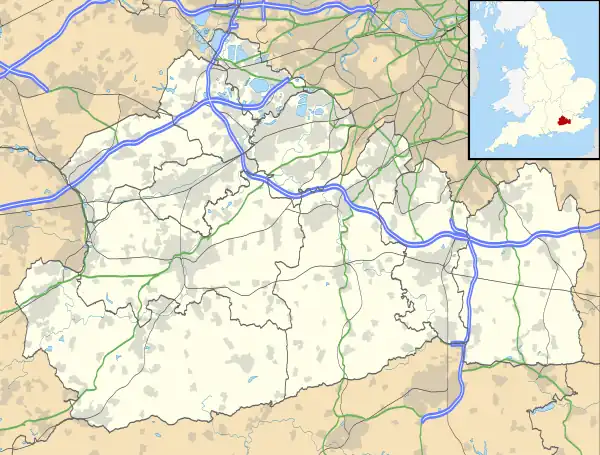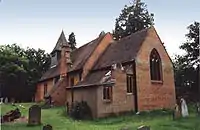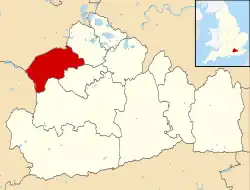Windlesham
Windlesham is a village in the Surrey Heath borough of Surrey, England, approximately 25 miles (40 km) south west of central London. Its name derives from the Windle Brook, which runs south of the village into Chobham, and the common suffix 'ham', the Old English word for 'homestead'. The civil parish of Windlesham has a population of 17,000 and includes the neighbouring villages of Bagshot and Lightwater.[2]
| Windlesham | |
|---|---|
 | |
 Windlesham Location within Surrey | |
| Area | 22.4 km2 (8.6 sq mi) |
| Population | 16,775 (Civil Parish 2011)[1] |
| • Density | 749/km2 (1,940/sq mi) |
| OS grid reference | SU930635 |
| Civil parish |
|
| District | |
| Shire county | |
| Region | |
| Country | England |
| Sovereign state | United Kingdom |
| Post town | WINDLESHAM |
| Postcode district | GU20 |
| Dialling code | 01276, some 01344 |
| Police | Surrey |
| Fire | Surrey |
| Ambulance | South East Coast |
| UK Parliament | |
Windlesham Arboretum, which covers an area of approximately 1 km2 (0.39 sq mi), is on the south side of the M3 motorway. Access to the motorway is via junction 3 and the nearest railway station is at Bagshot.
History

The neighbourhood has yielded bronze implements, now in the Archaeological Society's Museum, Guildford, and a certain number of neolithic flints.
Windlesham was once a small community within Windsor Great Park, built as a remote farming settlement around undulating heath, similar to Sunninghill. At Ribs Down in the north in private Updown Court and adjoining gardens land reaches 99 metres above sea level with a minimum descent (notch/col) of 31 metres, ranking 35th of 36 Surrey hills listed in the national hill-climbing database and the tallest private hill in Surrey.[3]
This corner of the county appears, from absence of notice in the Domesday Book of 1086, to have been very sparsely inhabited.[4] Of Windlesham, Malden wrote:
The old road had been the source of great prosperity in Bagshot till it was superseded by the railway. Thirty coaches a day passed through, and there were many inns, since closed. The most interesting history of the place is in connexion with Windsor Forest, and its bailiwick in Surrey. The tenure of Bagshot in the Red Book of the Exchequer is per serjentiam veltrariae, i.e. providing a leash of hounds. The later history is full of the exploits of highwaymen, who found the wild country hereabouts specially favourable for their purposes. The Inclosure Act of 1812 inclosed much of Bagshot Heath, and also inclosed the common fields of Windlesham. Inclosure had begun before, for in 1768 the lords of the manors and the freeholders gave land inclosed from the waste for charitable purposes.[4]
Windlesham Manor appears among the manors granted to Westminster by Edward the Confessor in his foundation charter. It was apparently transferred to the small local Broomhall Convent at an unknown date.
Newark Priory had a grant of land in Windlesham in 1256, and had the advowson (right to appoint the vicar) of the church. Joan Rawlyns, Prioress of Broomhall, made a voluntary surrender of the property of her house in 1522 before the 1538 Dissolution of the Monasteries. In the next year Windlesham was granted to St. John's College, Cambridge, who still held it in 1911[4]
In 1911 the village was, due to Surrey Heath, described as almost entirely modern, in much the same way as Wentworth, Surrey's landscape was tamed approximately at the turn of the 20th century, being naturally heather, gorse and fern and ideal for grass and laid out evergreen trees.[4]
Economy
The Lilly Research Centre, built in 1967, is located in the north of the village. The BOC Group was based in the village, but was bought by Linde plc (Linde AG of Germany) in September 2006.
Local schools
There are four schools in the Windlesham area, two of which are in the village itself: Windlesham Village Infants School. Woodcote House School is also in the area.
Recreation and social events
Windlesham Field of Remembrance is owned, funded and run by the village community via a board of volunteer trustees. The land was purchased from Admiral Cochrane in 1950 as a permanent memorial to the men and women of the village who lost their lives in the two World Wars, and is the site for the village's Remembrance Day ceremony. It consists of both open space and mature woodland and includes a play area. Many village events take place on the field, including the annual Village Fete. . The field is also used by the village's football and cricket clubs. Other groups in the village include Windle Valley Runners and Windlesham Drama Group
An annual pram race, in which teams race around the village stopping at every pub, usually happens every Boxing Day and raises money for local charities . In April 2017, the village was set to become a hedgehog friendly village,[5] reported to be one of a handful of such villages in the United Kingdom.[6]
Localities
Valley End

Valley End is a hamlet and chapelry in the Borough of Surrey Heath in Surrey, England 0.5 miles (0.80 km) east of Windlesham, so similarly is about 15 minutes drive from the South West Main Line at Woking to the southeast and from Sunningdale on the Waterloo to Reading Line to the north.
Valley End has two churches, St Saviour[7] which was built in 1867[8] by the English architect George Frederick Bodley and Emmanuel Baptist Church.[9] St Saviour's is built in red and brown brick with stone dressed windows. The interior is a simple mixture of brick and stone. There is a Holy Communion service every Sunday at 9am.[10]
Valley End School was founded in 1859 by the Hon. Julia Bathurst of Hyams Hall, Windlesham.[11]
The Valley End Cricket Club was founded in 1895.[12]
Bagshot
See Bagshot for this developed part of the civil parish. There is the greatest concentration of shops and businesses in Bagshot compared to the other parts of the parish.
Lightwater
See Lightwater for this developed part of the civil parish
The Arboretum and the mansion of Updown Court
Windlesham Arboretum is connected by footpath to the edge of the village centre but on the opposite side of the M3 motorway. In July 2007, the most expensive house in the world, Updown Court, in Windlesham was valued at £75m ($138m (USD)). This 103-room mansion has 58 acres (23 ha) of gardens and landscaped woodlands.[13]
Demography and housing
| Output area | Detached | Semi-detached | Terraced | Flats and apartments | Caravans/temporary/mobile homes | shared between households[1] |
|---|---|---|---|---|---|---|
| (Civil Parish) | 3,473 | 1,653 | 882 | 872 | 7 | 5 |
The average level of accommodation in the region composed of detached houses was 28%, the average that was apartments was 22.6%.
| Output area | Population | Households | % Owned outright | % Owned with a loan | hectares[1] |
|---|---|---|---|---|---|
| (Civil Parish) | 16,775 | 6,892 | 37.0% | 44.4% | 2,240 |
The proportion of households in the civil parish who owned their home outright compares to the regional average of 35.1%. The proportion who owned their home with a loan compares to the regional average of 32.5%. The remaining % is made up of rented dwellings (plus a negligible % of households living rent-free).
Notable residents
- Mukhtar Ablyazov, Kazakhstani exile, government minister and bank chairman, alleged perpetrator of "one of largest frauds to appear before a court in the UK". Had UK asylum status removed and fled to France [14]
- Dr Brian May, composer, guitarist and astrophysicist, member of the rock band Queen, and his wife, actress Anita Dobson
- Brian Blessed, actor, adventurer and broadcaster; current resident.
- Glenn Hoddle, England football manager
- Sir Nick Faldo, golfer
- Sarah, Duchess of York Queen Elizabeth II purchased Birch Hall on Church Road in 1997 as a future home for the Duchess and her daughters following the end of her marriage, but they never took up residence. [15]
- Elizabeth II lived in Windlesham Moor at one time shortly after her marriage before moving to Clarence House. After she became Queen she moved to Buckingham Palace.[16]
- Andrew Ridgeley, musician of Wham! was born in the nursing home that was along Hatton Hill, Windlesham.
- Edward Baigent was an early immigrant to Nelson, New Zealand and he was later elected to its Parliament.[17][18]
- Agatha Christie, crime writer, at Ribsden
- George Job Elvey, organist, died at The Towers
- Sir Joseph Hooker F.R.S., scientist, at The Camp[4]
- Sheikh Mohammed bin Rashid Al Maktoum, ruler of Dubai, has a property at Windlesham.
- Lin Blakley, EastEnders star
- Jessica Henwick, actress
References
- Key Statistics; Quick Statistics: Population Density Archived 11 February 2003 at the Wayback Machine United Kingdom Census 2011 Office for National Statistics Retrieved 21 November 2013
- "Windlesham Parish Council". Archived from the original on 2 February 2019. Retrieved 17 June 2020.
- Database of British and Irish Hills Archived 5 August 2018 at the Wayback Machine Retrieved 6 March 2015
- H.E. Malden, ed. (1911). "Parishes: Windlesham". A History of the County of Surrey: Volume 3. Institute of Historical Research. Retrieved 25 October 2012.
- "Hedgehog Awareness Week: Brian May backs Windlesham's bid to become Surrey's first 'hedgehog-friendly' village". Surrey Live. 19 April 2017. Archived from the original on 17 November 2018. Retrieved 17 November 2018.
- "The village that made itself hedgehog friendly". BBC News. 22 April 2017. Archived from the original on 26 April 2017. Retrieved 17 November 2018.
- British Listed Buildings
- "Chobham Village Website". Archived from the original on 19 June 2012. Retrieved 25 October 2012.
- "Emmanuel Baptist Church". Archived from the original on 6 January 2013. Retrieved 25 October 2012.
- "St Lawrence and St Saviour Church Diary". Archived from the original on 30 July 2012. Retrieved 25 October 2012.
- "Valley End School History". Archived from the original on 24 March 2012. Retrieved 25 October 2012.
- "Valley End Cricket Club History". Archived from the original on 24 March 2012. Retrieved 25 October 2012.
- Conradi, Peter; Helen Davies (15 July 2007). "The most expensive house in Britain?". The Sunday Times. Archived from the original on 30 May 2010. Retrieved 11 April 2010.
- "The UK's kleptocracy problem: How servicing post-Soviet elites weakens the rule of law" (PDF). Russia and Eurasia Programme. Retrieved 24 February 2022.
- "Revealed: £1.5million home Princess Beatrice and Eugenie turned down from the Queen Sarah Ferguson rejected the gift on her daughters' behalves". Hello Magazine. Archived from the original on 31 October 2020. Retrieved 30 October 2020.
- "60 Facts". royal.gov.uk. Archived from the original on 8 October 2015.
- "BAIGENT, Edward". Rootsweb. Archived from the original on 6 March 2012. Retrieved 3 July 2011.
- Wilson, James Oakley (1985) [First ed. published 1913]. New Zealand parliamentary record, 1840-1984 (4 ed.). Wellington: V.R. Ward, Govt. Printer. p. 181. OCLC 154283103.
